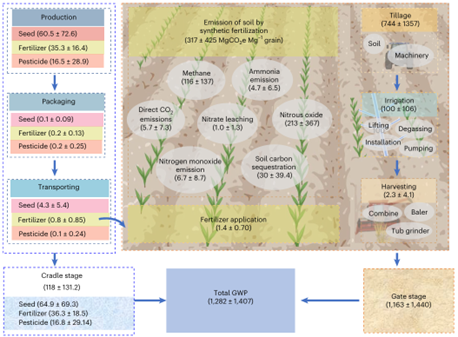November 4, 2024 | Nature Climate Change | Source |
Introduction: The research, led by scientists from South China Agricultural University (China) with a global team from Egypt, Russia, and Germany, examines the impacts of conventional agriculture on greenhouse gas (GHG) emissions and system sustainability from 1961 to 2020. Using a cradle-to-gate life cycle assessment, the study evaluates global warming potential (GWP) and sustainability index (SI) for major grain crops, linking intensive practices—including synthetic fertilizers, irrigation, and mechanization—to increased emissions and decreased sustainability.
Key findings: Since 1961, conventional agriculture has increased GWP eightfold while decreasing SI threefold, primarily due to synthetic fertilizers, irrigation, and tillage, which together contribute 90% of emissions. Rice production exhibited the highest GWP per grain unit, surpassing maize and wheat. Regional disparities were evident: South Asia recorded high GWP and declining SI due to heavy reliance on fertilizers and irrigation, while Europe maintained higher SI with moderate GWP increases, attributed to efficient resource use. Without mitigation, GWP could triple by 2100, and SI could decline fourfold due to inefficient input usage. However, adopting climate-smart practices, such as renewable energy integration and enhanced input efficiency, could reduce GWP to 2.3 PgCOâ‚‚e and quadruple SI. The study emphasizes the urgent need for region-specific sustainable practices to mitigate emissions while balancing food security. Future research should refine life cycle assessments to address spatial variability in soil and climate conditions and develop technologies tailored to regional crop systems to optimize sustainability and reduce emissions.

Figure | LCA of the global warming of conventional agriculture. Values between brackets are the global averages (MgCO2eMg−1 grain) of the three crops (maize, rice and wheat) in 2020. Values after ± are the standard deviations (n = 187, indicating number of the included countries. The cradle stage (bounded by dashed blue line) includes production, Gate stage (1,163 ± 1,440) packaging and transportation of seeds, fertilizers and pesticides. The gate stage (bordered by dashed orange line) includes farm-gate operations (application of fertilizers, soil emissions, tillage, irrigation and harvesting).





